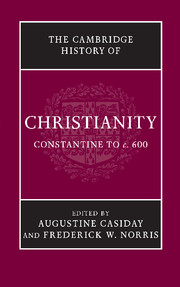Book contents
- Frontmatter
- Introduction
- Part I Christianity: Regional Developments
- Part II Christianity Contested
- Part III Christian Culture and Society
- Part IV Christian Beliefs and Practices
- 18 Discourse on the Trinity
- 19 History of Christology to the seventh century
- 20 Sin and salvation: Experiences and reflections
- 21 From Antioch to Arles: Lay devotion in context
- 22 Saints and holy men
- 23 Pastoral care and discipline
- 24 Sexuality, marriage and the family
- 25 The growth of liturgy and the church year
- 26 Interpreting scripture
- 27 Asceticism and monasticism, I: Eastern
- 28 Asceticism and monasticism, II: Western
- 29 Art and Propaganda fide: Christian art and architecture, 300–600
- Index
- Map 1 The Roman empire, c. 400">
- References
25 - The growth of liturgy and the church year
from Part IV - Christian Beliefs and Practices
Published online by Cambridge University Press: 28 March 2008
- Frontmatter
- Introduction
- Part I Christianity: Regional Developments
- Part II Christianity Contested
- Part III Christian Culture and Society
- Part IV Christian Beliefs and Practices
- 18 Discourse on the Trinity
- 19 History of Christology to the seventh century
- 20 Sin and salvation: Experiences and reflections
- 21 From Antioch to Arles: Lay devotion in context
- 22 Saints and holy men
- 23 Pastoral care and discipline
- 24 Sexuality, marriage and the family
- 25 The growth of liturgy and the church year
- 26 Interpreting scripture
- 27 Asceticism and monasticism, I: Eastern
- 28 Asceticism and monasticism, II: Western
- 29 Art and Propaganda fide: Christian art and architecture, 300–600
- Index
- Map 1 The Roman empire, c. 400">
- References
Summary
The fourth to the seventh centuries represent a period of considerable change as well as continuity for the Christian churches, and this was true of their worship. The Constantinian peace afforded the opportunity for new spacious church buildings, and a more public celebration of liturgy with more elaborate forms. The doctrinal battles of the fourth and fifth centuries – Arianism, Eunomianism, the Nicaeno-Constantinopolitan Trinity, and the later struggle between Cyril and Nestorius – left their marks on worship forms and texts. The development of the monastic movement, with its concern for constant prayer, also influenced worship patterns. A Spanish nun named Egeria visited the Holy Land c. 382, and kept a travelogue for her sisters back in Spain. Of worship in Jerusalem during Lent, Egeria wrote:
On Sundays the bishop reads the Gospel of the Lord’s resurrection at first cockcrow, as he does on every Sunday throughout the year. Then till daybreak, they do everything as they would on an ordinary Sunday at the Anastasis and the Cross. In the morning they assemble (as they do every Sunday) in the Great Church called the Mysterium on Golgotha behind the Cross, and do what is usual to do on Sunday. After the dismissal in this church they go singing, as they do every Sunday, to the Anastasis, and it is after eleven o’clock by the time they have finished. Lucernare [service of lighting candles] is at the normal time when it always takes place in the Anastasis and At the Cross and in all other holy places; for on Sundays there is no service at three o’clock.
- Type
- Chapter
- Information
- The Cambridge History of Christianity , pp. 601 - 617Publisher: Cambridge University PressPrint publication year: 2007
References
- 1
- Cited by



